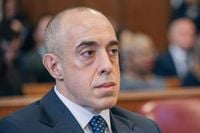As the Senate prepares for a critical vote this week, Emil Bove, a senior Justice Department official and former personal attorney to Donald Trump, faces mounting allegations from multiple whistleblowers accusing him of misleading lawmakers and undermining the rule of law. Bove, nominated for a lifetime appointment to the U.S. Court of Appeals for the Third Circuit, has come under intense scrutiny amid claims that he encouraged defiance of court orders related to the Trump administration’s aggressive immigration policies.
At the heart of the controversy are whistleblower complaints that allege Bove instructed DOJ attorneys to ignore judicial rulings blocking the mass removal of immigrants under the Alien Enemies Act. One such whistleblower, Erez Reuveni, a former DOJ prosecutor who was dismissed in April 2025, publicly accused Bove of telling subordinates that they might need to tell the courts "fuck you" to ensure the deportation flights took off regardless of court orders. Reuveni’s complaint detailed a March 2025 meeting where Bove reportedly stressed that "the planes need to take off no matter what," highlighting a willingness to flout judicial authority to fulfill the administration’s immigration agenda.
This allegation alone sparked fierce debate during Bove’s confirmation hearing before the Senate Judiciary Committee in June 2025. When questioned about his involvement in these matters, Bove repeatedly declined to elaborate, often invoking deliberative process privilege and giving terse answers such as, "I participated in the matter." When pressed about the use of the expletive, he sidestepped directly confirming it, instead saying, "I’ve certainly said things encouraging litigators at the department to fight hard for valid positions that we have to take."
Adding to the pressure, a second whistleblower, whose identity is being protected, stepped forward with corroborating evidence supporting Reuveni’s claims. Represented by Whistleblower Aid, this former DOJ attorney disclosed substantive internal documents to the DOJ’s Office of Inspector General, asserting that Bove and other senior officials were "actively and deliberately undermining the rule of law." Whistleblower Aid stated their client provided evidence showing high-level DOJ personnel knowingly defied court orders, directed subordinate attorneys to misrepresent facts to the courts, and engaged in schemes to withhold relevant information to advance deportation efforts.
The Trump administration’s controversial decision to send approximately 200 Venezuelan migrants to a prison in El Salvador, despite a federal judge’s order blocking such flights, is a focal point of this legal turmoil. U.S. District Judge James Boasberg had initially halted the deportations and found probable cause to hold the administration in criminal contempt for willful disobedience. Yet, the flights proceeded, with migrants eventually released back to Venezuela after being detained in El Salvador.
Further complicating Bove’s confirmation is a third whistleblower account that emerged just days before the anticipated Senate vote. Senate Judiciary Committee Chair Chuck Grassley’s staff met on July 28, 2025, with lawyers representing this new whistleblower, who is reportedly a former DOJ attorney working in immigration litigation. Grassley remarked on the difficulties in securing the meeting and expressed concerns about the Democrats’ handling of whistleblower information, calling it a "political hit job" aimed at derailing Bove’s nomination.
Meanwhile, a group of former Justice Department employees known as the Justice Connection publicly declared they had "strong evidence that Emil Bove was not truthful to the Senate Judiciary Committee during his confirmation hearing." Though details remain scarce, the group’s statement adds to the chorus of voices questioning Bove’s honesty and suitability for the federal bench.
Senate Democrats, led by Judiciary Committee Ranking Member Sen. Dick Durbin, have been vocal in opposing Bove’s nomination. Durbin’s spokesperson described the accumulating whistleblower evidence as "another damning indictment of a man who should never be a federal judge." Democrats have also criticized the Republican-controlled committee for advancing Bove’s nomination without granting a hearing for whistleblower Reuveni, a request denied by committee Republicans.
Despite these concerns, Bove retains significant support among Senate Republicans. With a 53-47 majority, Republicans hold the numbers to confirm him, though two GOP senators—Susan Collins of Maine and Lisa Murkowski of Alaska—have indicated they will oppose his confirmation. This leaves Democrats needing to sway at least two more Republicans to block the nomination, a challenging prospect given the current Senate dynamics.
Bove’s professional background further fuels the debate. Prior to his DOJ role, he served as a criminal defense attorney for Trump, representing him in three of the four criminal cases related to the former president, including the hush-money scandal. Since joining the Justice Department, Bove has been involved in reshaping the agency’s priorities, notably by firing career prosecutors linked to convictions from the January 6 Capitol riot and dismissing a federal corruption case against New York City Mayor Eric Adams.
The nomination is viewed by some as a stepping stone to a potential future Supreme Court appointment, given the Third Circuit’s jurisdiction over Pennsylvania, New Jersey, Delaware, and the Virgin Islands. This prospect has heightened the stakes, with dozens of former judges and prosecutors signing letters expressing concerns about Bove’s qualifications and temperament.
In defense of Bove, Deputy Attorney General Todd Blanche—also a former personal attorney for Trump—published an op-ed praising him as "the most capable and principled lawyer I have ever known." The Justice Department has maintained that Bove is a "highly qualified judicial nominee" who has contributed significantly to protecting civil rights and dismantling foreign terrorist organizations.
As the Senate vote looms, the controversy surrounding Emil Bove encapsulates the broader tensions within the Justice Department and the federal judiciary over loyalty, the rule of law, and the politicization of legal enforcement. Will the Senate confirm a nominee whose critics allege a willingness to defy court orders and mislead lawmakers? Or will the whistleblower revelations tip the balance against him? The coming days promise a decisive moment for both Bove’s career and the integrity of the federal bench.


